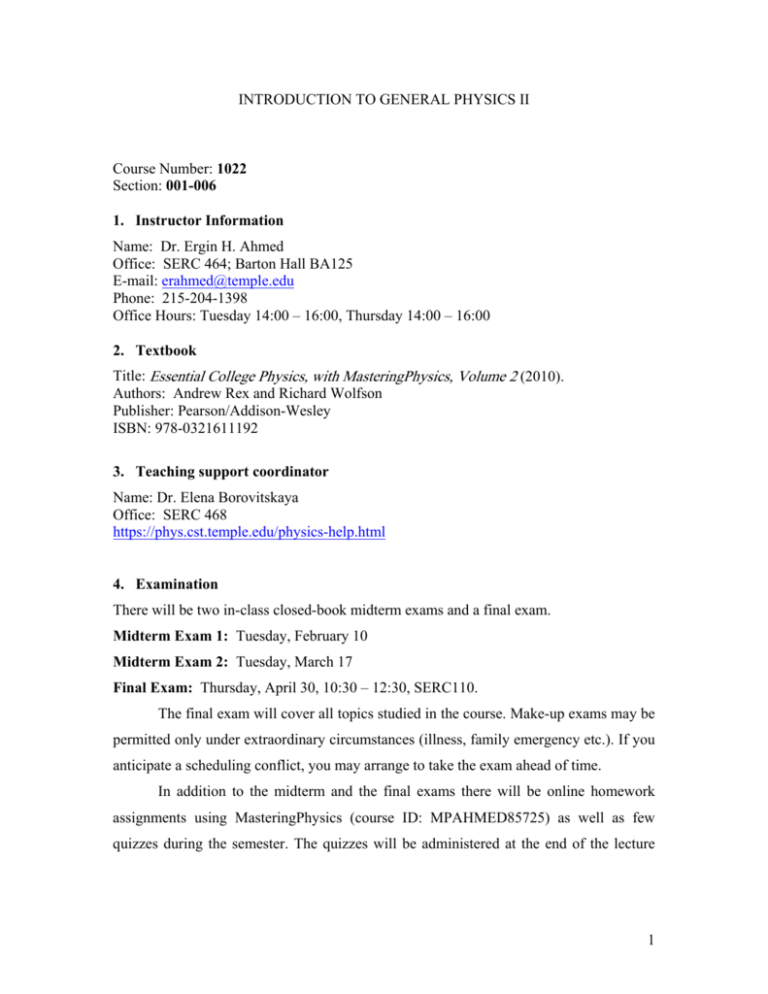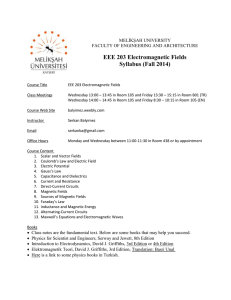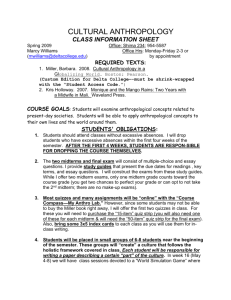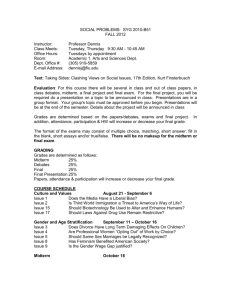
INTRODUCTION TO GENERAL PHYSICS II
Course Number: 1022
Section: 001-006
1. Instructor Information
Name: Dr. Ergin H. Ahmed
Office: SERC 464; Barton Hall BA125
E-mail: erahmed@temple.edu
Phone: 215-204-1398
Office Hours: Tuesday 14:00 – 16:00, Thursday 14:00 – 16:00
2. Textbook
Title: Essential College Physics, with MasteringPhysics, Volume 2 (2010).
Authors: Andrew Rex and Richard Wolfson
Publisher: Pearson/Addison-Wesley
ISBN: 978-0321611192
3. Teaching support coordinator
Name: Dr. Elena Borovitskaya
Office: SERC 468
https://phys.cst.temple.edu/physics-help.html
4. Examination
There will be two in-class closed-book midterm exams and a final exam.
Midterm Exam 1: Tuesday, February 10
Midterm Exam 2: Tuesday, March 17
Final Exam: Thursday, April 30, 10:30 – 12:30, SERC110.
The final exam will cover all topics studied in the course. Make-up exams may be
permitted only under extraordinary circumstances (illness, family emergency etc.). If you
anticipate a scheduling conflict, you may arrange to take the exam ahead of time.
In addition to the midterm and the final exams there will be online homework
assignments using MasteringPhysics (course ID: MPAHMED85725) as well as few
quizzes during the semester. The quizzes will be administered at the end of the lecture
1
and will have duration of 30 min. The date and the material included in each quiz will be
announced a week before.
5. Grading
Labs 15%
Quizzes and homework assignments 20 %
Midterm 1 exam 15 %
Midterm 2 exam 20 %
Final Exam 30 %
Approximate letter grade assignment:
A
AB+
B
BC+
C
CD
F
100% to 90%
90% to 85%
85% to 80%
80% to 75%
75% to 70%
70% to 67%
67% to 60%
60% to 55%
55% to 45%
45% to 0%
6. Syllabus
15. Electric Charges, Forces, and Fields
15.1. Electric Charges
15.2. Coulomb’s Law
15.3. Coulomb’s Law for Multiple Charges
15.4. Electric Fields
15.5. Charged Particles in Electric Fields
16. Electric Energy, Potential, and Capacitors
16.1. Electric Potential Energy
16.2. Electric Potential
16.3. Electric Potential and Electric Field
16.4. Capacitors
16.5. Dielectrics
17. Electric Current, Resistance, and Circuits
17.1. Current and Resistance
17.2. Batteries: Real and Ideal
2
17.3. Combining Resistors
17.4. Electric Energy and Power
17.5. RC Circuits
17.6. Semiconductors and Superconductors
18. Magnetic Fields and Forces
18.1. Magnets, Poles, and Dipoles
18.2. Magnetic Forces on a Moving Charge
18.3. Application of Magnetic Forces
18.4. Magnetic forces on Conducting Wires
18.5. The Origins of Magnetism
18.6. Magnetic Materials
19. Electromagnetic Induction and Alternating Currents
19.1. Induction and Faraday’s Law
19.2. Motional emf
19.3. Generators and Transformers
19.4. Inductance
19.5. AC Circuits
20. Electromagnetic Waves and Special Relativity
20.1. Electromagnetic Waves
20.2. The Electromagnetic Spectrum
20.3. The Fundamental Speed c
20.4. Relativity of Time and Space
20.5. Relativistic Velocity and Doppler Effect
21. Geometrical Optics
21.1. Reflection and Plane Mirrors
21.2. Spherical Mirrors
21.3. Refraction and Dispersion
21.4. Thin Lenses
21.5. Microscopes and Telescopes
21.6. The Eye and Vision
22. Wave Optics
22.1. Interference
22.2. Double-Slit Interference
22.3. Diffraction
22.4. Polarization and Scattering
23. Modern Physics
23.1. Quantization
23.2. Black Body Radiation and Plank’s Constant
23.3. Photons
23.4. Wave Particle Duality
24. Atomic Physics
24.1. The Nuclear Atom
24.2. The Bohr Atom
3
24.3. Quantum Numbers and Atomic Spectra
24.4. Multi-Electron Atoms and the Periodic Spectra
24.5. Radiation from Atoms
25. Nuclear Physics
25.1. Nuclear Structure
25.2. The Strong Force and Nuclear Stability
25.3. Radioactivity
25.4. Activity and Half-Life
25.5. Nuclear Fission
25.6. Fusion
26. A Universe of Particles
26.1. Particles and Antiparticles
26.2. Particles and Fundamental Forces
26.3. Classifying Particles
26.4. Quarks
26.5. Particle Accelerators
26.6. Particles and the Universe
4












